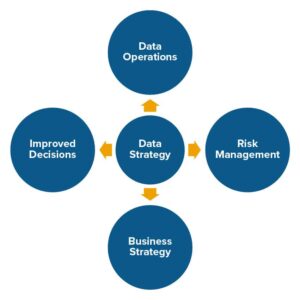
What is a Data Strategy & Why is it Important?
The Importance of Data Strategy
Data is a vital asset for businesses in today’s digital age. A well-defined data strategy is crucial for harnessing the full potential of your organization’s data. In 2023, amidst evolving data management, companies require an essential data strategy due to growing complexity.
A robust data strategy can help businesses across the board. This includes improving decision-making, fostering innovation, and protecting sensitive data. This allows you to harness the full potential of your data assets. By investing in a strong data strategy, businesses can improve financial performance, increase productivity, and stay ahead of the competition. According to a report by McKinsey & Company, organizations that effectively use data and analytics have the potential to increase their profitability by as much as 60%. So read on to learn why a data strategy that looks to the future needs of business is critical, and then feel free to reach out and set up some time to chat. Data Ideology can be the perfect partner when getting a data strategy in place for your organization.
Common Data Strategy Pain Points
Although many leaders agree data should be the foundation of their company, there is frequently a disconnect between the hypothetical perfect data state and their current situation. When we talk to CIOs and CDOs, several themes arise time and time again:
- “We find ourselves taking too long to make decisions with data we don’t completely trust.”
- “Each time a new request comes in for data, it feels like we’re starting from scratch.”
- “We need to improve data access, transparency, and privacy.”
- “The pace of business over the last two years has been fast and furious. It’s clear that our data strategy does not support our business strategy.”
- “The word legacy comes to mind, whether it’s legacy processes, legacy technologies, or legacy methodologies. We must think and act differently.”
Sound familiar? The situation companies find themselves in is understandable given what’s happened from a 5-V perspective (volume, variety, velocity, veracity, and value) over the past several years. Data velocity went supersonic, while volume and variety exploded. At the same time, veracity and value lagged. The result is many organizations are face to face with deep cracks in their data foundations, as homegrown and legacy solutions haven’t kept pace. These are serious problems that, if not addressed appropriately, can make your data seem more like a liability than an asset.
The lack of a centralized, cohesive approach to data management can lead to siloed data sources, inconsistent data definitions, and difficulty in accessing and analyzing data across different departments and teams. A robust data strategy can help address these issues by establishing a clear data governance framework and establishing standards and protocols for data collection, storage, and analysis.
The Benefits of Data Strategy
A proper data strategy is a plan for how an organization will collect, process, and analyze data to realize the full potential of its business goals and objectives. It outlines the types of data that the company will focus on, the tools and technologies that will be used to manage the data, and the processes and policies that will be put in place to ensure the data is used effectively. A well-planned data strategy can provide a range of benefits for an organization, including increased engagement, maximum flexibility, and cost savings.
Increased engagement: A data strategy can help ensure that data is being used effectively to inform and support business decisions, which leads to increased engagement with the data and a greater sense of ownership and responsibility among employees. A data strategy builds the foundation to leverage data strategically.
Maximum flexibility: A data strategy can provide a framework for how data is collected, stored, and processed, which can give an organization the flexibility to adapt to changing business needs and take advantage of new opportunities as they arise. Having reusability and scalability in your data ecosystem drives agility, and in times like this, that’s what businesses need to thrive.
Cost savings: A data strategy can help organizations optimize their use of data and analytics, which can lead to cost savings—and we’re not talking headcount reductions. By reducing the reliance on heroic efforts in the business to create data assets, resource capacities can be reallocated to more value-added activities (using your data strategically) while reducing risk.
Overall, a well-planned data strategy can help organizations make the most of their data assets and drive business growth and success.
Aligning Data Strategy with Business Goals
Your data strategy should be aligned with your business goals. But all too often, data strategies are too narrowly focused or so broad that they’re impossible to implement (like trying to boil the ocean). Finding the balance between these two extremes will help you get the most value out of your data strategy.
Organizations typically develop data strategies to improve or support four business areas:
- Data Operations
- Risk management
- Business strategy
- Improved Decision-Making

Data Operations
Identify and move to eliminate inefficient data processes. Data management processes that are inefficient or outdated can hinder the ability of an organization to make informed decisions, leading to poor outcomes. And many organizations process data in isolated departments, groups, and individuals, creating data silos. Separate teams with tools and techniques manage the data for each silo in their way. Data is extracted, modeled, transformed, aggregated, calculated, and presented to business consumers according to the different rules of each group. This process involves massive duplication of effort, inconsistency, and manual effort with little reuse.
But a well-planned data strategy will improve operational efficiency and productivity within an organization. Ideally, data allows for determining demand in the market and making proper plans to fulfill them in time. Flexible data is easily transformed and interpreted appropriately to meet specific business targets. The information architecture—how data is collected, stored, altered, distributed, and consumed to achieve the set goals—helps in converting data into valuable information to support growth.
Risk Management
Companies face many challenges regarding data privacy and security, such as adhering to policies, protecting company secrets, and securing data from external and internal threats. Companies are at significant risk when hackers steal customer information—data breaches can prove extremely costly. Indeed, as of 2022, the average cost of a data breach in the United States amounted to $9.44 million, up from $9.05 million the previous year. On top of financial losses, data breaches can also result in lawsuits, regulatory penalties, and reputational damage. Data strategy enables companies to design efficient data management activities to enhance information security.
Business Strategy
In addition to improving operational efficiencies and reducing risk, a data strategy can also help companies drive their business strategy. A recent IDC study concluded that data-mature companies achieve 2.5x better business outcomes, and significant increases were seen in revenues, profits, and lifetime customer value. At Data Ideology, our data strategists go through an extensive discovery process to ensure we deeply understand your company’s products and services to ensure your data strategy aligns with your business goals and objectives.
More than ever before, companies see the value in the data they collect daily. With some effort and planning, they can turn transaction data, product usage data, and customer activity into new products or services to offer their customers, or even tap into new customer segments. Data should be the fuel that drives your business. As the economy has shifted quickly, and potentially business strategies as well, your data needs to rise to the occasion.
Improved Decision-Making
Research conducted by McKinsey suggests companies who strategically use data, such as consumer behavior insights, to inform their business decisions outperform their peers in sales growth by 85%. So, it’s easy to see that a key benefit of implementing a data strategy is improved decision-making. By collecting, processing, and analyzing data in a systematic way, companies can make more informed and accurate data-driven business decisions. This method lets your team get refined data immediately and make the right choices to improve performance and profitability. Further advantages include better data management, analytics, and the skills required to assist executive decision-making in improving financial performance.
Outcomes of improved decision-making can include enhanced customer experience through real-time reporting, strengthened customer support, and increased customer satisfaction. Real-time reporting allows organizations to understand their business live and address any challenges or shifts in the market promptly. Making the best decision possible in that particular moment is difficult if you don’t have a supporting data strategy.
In Summary
A well-executed data strategy is necessary for companies to improve operational efficiency and decision-making, reduce risk, and enhance business strategy. Data can be used to understand customer behavior and deliver the right products and services at the right time, and a robust data strategy can also help companies avoid building data silos and ensure that data is shared across the organization. With uncertainty upon us, and the last two years presenting many new challenges, take time now to “sharpen the axe.” Get a data strategy in place that addresses your challenges and puts your organization in the best possible position for the future growth that’s coming.

